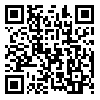BibTeX | RIS | EndNote | Medlars | ProCite | Reference Manager | RefWorks
Send citation to:
URL: http://ijict.itrc.ac.ir/article-1-472-en.html
2- Computer Engineering School Iran University of Science and Technology Tehran, Iran ,
Most of the data on the web is in the form of natural language, but natural language is highly ambiguous, especially when it comes to the frequent occurrence of entities. The goal of entity linking is to find entity mentions and link them to their corresponding entities in an external knowledge base. Recently, FarsBase was introduced as the first Persian knowledge base with nearly 750,000 entities. This research suggested one of the first end-to-end unsupervised entity linking systems specifically for Persian, using context and graph-based features to rank candidate entities. To evaluate the proposed method, we used the first Persian entity-linking dataset created by crawling social media text from some popular Telegram channels. The ParsEL results show that the F-Score of the input data set is 87.1% and is comparable to any other entity-linking system that supports Persian.
| Rights and permissions | |
 | This work is licensed under a Creative Commons Attribution-NonCommercial 4.0 International License. |




